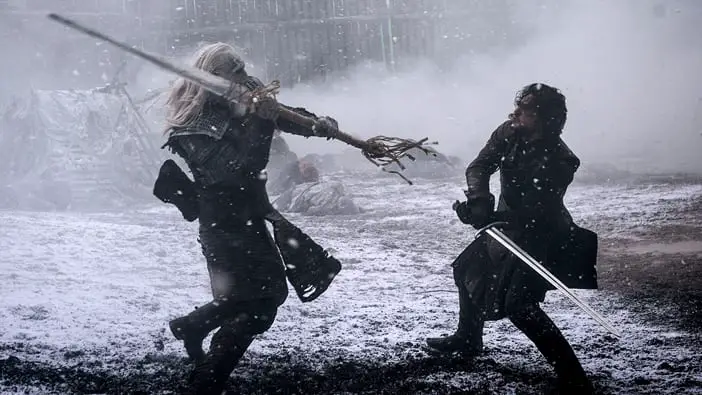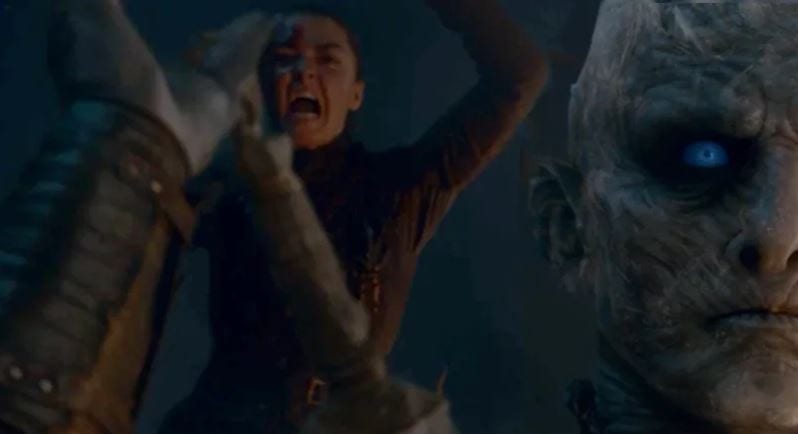I mean, it did. But I’m not sure it did for the reason most fans are citing.
I’m in a particularly weird spot this week in Game of Thrones viewership. Our “Unabashed Book Snobbery” brand around here is very well known, and I have not found this to be a good quality show in a number of years. Even Jaime knighting Brienne didn’t move me because of how mangled I find these character arcs, and sapped of emotional investment I am.
Yet I liked “The Long Night.” I really liked it, and liked what it specifically did to the narrative, since it’s not like the spooky scary skeletons were ever a strength of this show. Though I do suspect this complete subversion in focal point with what feels like a decent amount of the show left (only halfway through a season with at least two feature-length episodes to go) is something that’s actually inspired by George R.R. Martin’s plan.
Don’t all throw stones at once.
I first have to get a few things out of the way: I don’t believe this show is a good adaptation of the books, I don’t believe showrunners David Benioff and Dan Weiss (D&D) are closely following the outline Martin provided them several years ago, and I definitely don’t believe a “same ending” is even possible in this case. For one there’s no Night King figure in the books, and Martin has specifically spoken out against the concept of one central evil figure.
“Much as I admire Tolkien, and I do admire Tolkien—he’s been a huge influence on me, and his Lord of the Rings is the mountain that leans over every other fantasy written since and shaped all of modern fantasy—there are things about it, the whole concept of the Dark Lord, and good guys battling bad guys, Good versus Evil, while brilliantly handled in Tolkien, in the hands of many Tolkien successors, it has become kind of a cartoon. We don’t need any more Dark Lords, we don’t need any more, ‘Here are the good guys, they’re in white, there are the bad guys, they’re in black. And also, they’re really ugly, the bad guys‘.”
Given what just happened in the show for the walking dead to be defeated…how can there be a similar ending? A butt in a chair does not an ending make.
It’s also pretty clear from Martin’s quote that the way in which D&D adapted the White Walkers and threat of the dead very largely missed that point. We’ve known this since “Hardhome.” In the books, there’s always seemed to be something more to the Others, as if they have a purpose. There’s questions about how they affect the weather cycles. There’s questions about if there’s some kind of dynamic between them and greenseers. There’s absolutely questions about the folklore figure of the “Night’s King”, though not in the sense that we suspect he’s the *one* Other to beat.
On the show…they’re the bad guys, they’re in black. They’re also largely ugly zombies. The good guys fight them, and the most this is subverted is in the fact that they too wear darker clothes.

So I don’t want to sit here and pretend D&D “got it” when it came to portraying this theater and this threat. They very baldly didn’t. In fact, commenter Ann Taylor said it beautifully on our liveblog post for this episode:
“Hey, I figured out what is so wrong for me. And it’s not Arya killing [the Night King] without context, it’s not abandoning all other prophecies and destinies, it’s not [the] terribly stupid fight, it’s not characters overlasting their point and purpose. It’s the fact, that White Walkers could be literally anyone and totally non magic, because they didn’t change one single thing in the Westeros. If they were any other human army, it’s the same. The society, the system, it all stays the same apparently, two days of winter, sh-tton of survivors and 80% of untouched lands will make sure the feudal lords and queens and kings will continue “the wheel”, no worry about any foreign people who could possibly mingle with the system a little at least, since they all died nicely without bothering us. That’s the problem. The White Walkers weren’t any huge threat that do something. They were just a really big army for one of many many many many battles in unchanging world meaning nothing.”
You can’t see me, but I am Ned Stark slow-clapping here.
This is the nail on the head. Any mysticism, any lore, any prophecies…moot. And while Martin’s books have earned a reputation for subverting expectations of typical fantasy tropes, it’s an entirely different ballgame when the expectation subverted is in-depth seeding/character arcs mattering and affecting the story. As Jana articulated yesterday, the issue with Arya’s kill is its narrative fit, and it just doesn’t seem like Martin is going to be doing anything remotely comparable.
I agree! I agree on all of this! I don’t think we’re going to have anything even bearing resemblance to this week’s episode in the books. And even though Northern Mysticism was never exactly well-executed on Thrones, I’m absolutely sympathetic to the criticism that this plotline—built since the first scene—ended with an anticlimax. It was one battle, one target, and everyone saved at the buzzer by a character who was selected for the task specifically to surprise us.
I can hang with the book snobs, right?

The thing is, one of the most common reactions I’ve seen within the A Song of Ice and Fire fandom is to say something along the lines of, “This episode missed the point so badly! The ‘game of thrones’ doesn’t matter! What matters is the threat of the Others (White Walkers), and yet here they are, putting the political squabble back front and center.” And I…think I disagree.
Yes, there’s a reason A Game of Thrones was a title of a book, when the series is A Song of Ice and Fire. These concerns are supposed to, in some ways, seem petty when there’s a clear threat to humanity that is recognized in the prologue chapter. I just don’t happen to think Martin is writing his books so that our takeaway is “humanity’s survival trumps all other concerns.” For those who point to the climate change analogy, while it is very on-the-nose in a way that feels quite relevant (I work in that field for a reason), I think we can also acknowledge that when Martin began work on the books in 1991, he wasn’t thinking of that. In fact, he’s said so:
“It’s kind of ironic because I started writing “Game of Thrones” all the way back in 1991, long before anybody was talking about climate change. But there is — in a very broad sense — there’s a certain parallel there.”
No, I think Martin has always been pretty clear on his central thesis, which relates back the quote about a dark lord. Heck, his motivation is clear based on his very structure, where we have close, omniscient windows into many point-of-view characters:
“The battle between Good and Evil is a theme of much of fantasy. But I think the battle between Good and Evil is fought largely within the individual human heart, by the decisions that we make.” —George R.R. Martin
He writes grey characters…very grey. This is why Thrones’s tendency to create one-note characters we’re supposed to root for or boo feel so off to us, whether they be Saint Tyrion or Ramsay Sue.
The questions we often grapple with in reading A Song of Ice and Fire relate to identity, redemption, and morality. Could Jaime, the man who pushed Bran out of a window, ever truly become Goldenhand the Just? Is it a sustainable position for Jon to make a series of complicated moral concessions at the cost of his identity? Does Brienne have a fit in this world? It comes back to those internal struggles, and the intersection of the personal and the political.
The battle for humanity mattering the most isn’t a point unto itself; it’s the classically epic backdrop that serves as a test for our characters. It’s the song that is being told, yes. But the takeaway isn’t that the petty political squabbling doesn’t matter…quite the opposite. It’s the petty political squabbling and the reality of participating in this society that define the characters. What qualities of leadership matter? Do folklore-esque heroes have opinions on trade? Can humanity divorce itself from its own system in order to save it?
Again, Martin has made this explicit:
“Ruling is hard. [A Song of Ice and Fire] was maybe my answer to Tolkien, whom, as much as I admire him, I do quibble with. Lord of the Rings had a very medieval philosophy: that if the king was a good man, the land would prosper. We look at real history and it’s not that simple. Tolkien can say that Aragorn became king and reigned for a hundred years, and he was wise and good. But Tolkien doesn’t ask the question: What was Aragorn’s tax policy? Did he maintain a standing army? What did he do in times of flood and famine? And what about all these orcs? By the end of the war, Sauron is gone but all of the orcs aren’t gone – they’re in the mountains. Did Aragorn pursue a policy of systematic genocide and kill them? Even the little baby orcs, in their little orc cradles?”
In the same interview, Martin praises Tolkien’s chapter “Scouring of the Shire,” where following Sauron’s defeat, the heroes return home to see that it is overrun by ruffians led by Saurman, who took up residence in Bag-End. It’s the aftermath of the war and a political end that needs to be tied up. It doesn’t negate what our heroes went through in any way, and it certainly doesn’t imply that the threat of Saruman starting a hobbit gang was greater than Sauron’s forces of evil. Should Martin do something similar, I’m guessing confronting the army of the dead will have a lasting effect on those who survive, rather than having them be cheerfully champing at the bit for another battle within the week.

But I guess on some level, I’ve never seen seen the threat of the undead as the main, final theater in A Song of Ice and Fire. Now that Game of Thrones made that choice…I have to wonder if that’s why.
I’m sure book readers don’t think the second battle for dawn will conclude on the penultimate page, but I do suggest that maybe fans of the series steel themselves now—we’re going to be getting Azor Ahai’s tax policy. And it’s probably going to take a whole lot more than one chapter to explain.

